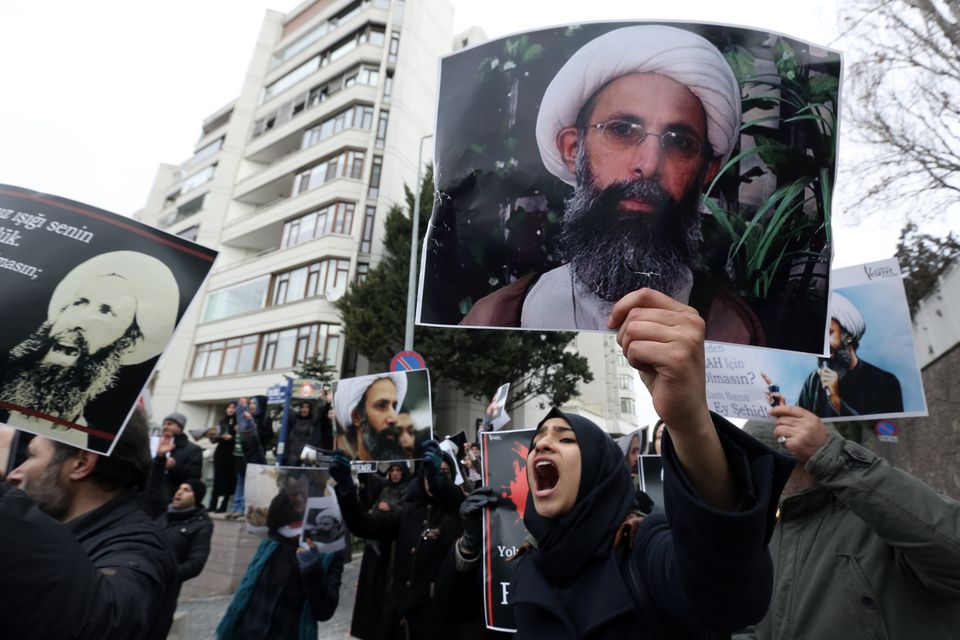-
Tips for becoming a good boxer - November 6, 2020
-
7 expert tips for making your hens night a memorable one - November 6, 2020
-
5 reasons to host your Christmas party on a cruise boat - November 6, 2020
-
What to do when you’re charged with a crime - November 6, 2020
-
Should you get one or multiple dogs? Here’s all you need to know - November 3, 2020
-
A Guide: How to Build Your Very Own Magic Mirror - February 14, 2019
-
Our Top Inspirational Baseball Stars - November 24, 2018
-
Five Tech Tools That Will Help You Turn Your Blog into a Business - November 24, 2018
-
How to Indulge on Vacation without Expanding Your Waist - November 9, 2018
-
5 Strategies for Businesses to Appeal to Today’s Increasingly Mobile-Crazed Customers - November 9, 2018
Tensions High after Saudi Arabia Executes Shiite Cleric
Iranian protesters stormed the Saudi embassy in Tehran early today and Shia Iran’s top leader predicted “divine vengeance” for Saudi Arabia’s execution of a prominent Shia cleric.
Advertisement
Shiite-majority Iran expressed outrage over the execution of Sheikh Nimr al-Nimr, who was put to death along with 46 others convicted of terrorism charges, including three other Shiite dissidents and a number of al-Qaida militants.
Demonstrators in Tehran broke into the Saudi Embassy early Sunday morning to protest the execution of Shiekh Nimr al-Nimr, a leader of the country’s Shiite minority.
While Shiite leaders hit out at Saudi Arabia’s actions, the United Arab Emirates and Bahrain defended their Sunni ally, saying the executions were necessary to confront extremism. “The only thing he did was public criticism”.
Saudi Arabia had branded Nimr an “instigator of sedition” and arrested him in 2012, after a video on YouTube showed him making a speech celebrating the death of the then interior minister.
Saudi Arabia cut ties with Iran, the Kingdom’s foreign minister announced on Sunday, deciding “enough is enough” with the Islamic Republic, according to a source with knowledge of the Saudi government’s thinking.
The leader of Lebanon’s Shia Hezbollah movement, Hassan Nasrallah, launched his sharpest attack yet on the Saudi ruling family on Sunday, accusing them of seeking to ignite a Shia-Sunni civil war across the world.
Iran did not stop defending ardently Nimr al-Nimr, who was executed on Saturday January 2 in Saudi Arabia.
In Washington, a State Department spokesman said Washington was concerned the execution of Nimr could worsen sectarian tensions at a time when they urgently need to be reduced.
The two countries have always been at odds, but Saudi Arabia’s execution of Shiite cleric Nimr al-Nimr Saturday kicked off a new round of sparring between them that analysts say could mark a risky shift in an already volatile region.
Forty-seven people, mostly suspected Al Qaeda members but also the sheikh, were executed on Saturday after being convicted of adopting the radical “takfiri” ideology, joining “terrorist organisations” and implementing various “criminal plots”. The execution of 47 people – 45 Saudis, one Egyptian and a man from Chad – was the biggest mass execution for security offences in Saudi Arabia since the 1980 killing of 63 jihadist rebels who seized Mecca’s Grand Mosque in 1979.
SAUDI Arabia has severed diplomatic ties with Iran following an attack on the kingdom’s embassy in Tehran.
The political Analyst, Fahd al-Ghayadh, told Asharq Al-Awsat that Nimr al-Nimr is not but an Iranian party working in Saudi Arabia as he called several times for applying the Providence of the Jurist) Wilayat al Faqih( in Saudi Arabia, during religious events.
Among them was Fares al-Shuwail, described by Saudi media as Al-Qaeda’s top religious leader in the kingdom.
In Iraq, a Shia icon directed followers to protest in front of the Saudi Arabian embassy in Baghdad.
On Sunday, Al-Nimr’s brother, Mohammed al-Nimr, called for the cleric’s supporters to protest against his execution and to do so peacefully.
Iran’s powerful Revolutionary Guard has compared Saudi Arabia’s execution of an opposition Shiite cleric to attacks carried out by the extremist Islamic State group. The law codified that the kingdom could prosecute as a terrorist anyone who demands reform, exposes corruption or otherwise engages in dissent or violence against the government.
Advertisement
United Nations chief Ban Ki-moon said he was “deeply dismayed” by Saudi Arabia’s execution of 47 people including the prominent Shia cleric, reports AFP. Analysts warned the execution threatened to inflame sectarian tensions in the Middle East.





























